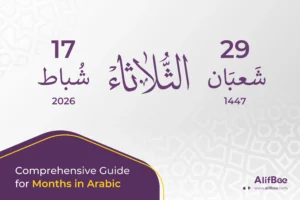Eat A Healthy Ramadan Diet
Ramadan offers a unique opportunity for Muslims to cleanse both their soul and body. But, in the middle of this spiritual endeavor, the challenge of maintaining a healthy lifestyle becomes important. Neglecting proper nutrition and physical well-being can not only reduce the effectiveness of the fast but also impact long-term health.
Therefore, it’s essential to adopt healthy habits that support both your physical and spiritual journey. This includes everything from the pre-dawn meal of Sahoor to the breaking of the fast at Iftar, alongside hydration, sleep, and exercise.
It might seem difficult to balance these aspects, but with the right guidance, a healthy Ramadan is within reach. Our blog offers 10 comprehensive tips to help you maintain a balanced, healthy, and spiritually fulfilling Ramadan. We have also added these tips in Arabic for our loyal Arabic learners, so the benefit is doubled.
Tip 1: تَناوَل سَحورًا مُتوازنًا
Eat a balanced suhoor
Tanāwal saḥūran mutawāzinan The pre-dawn meal or Sahoor is crucial for fasting Muslims as it provides them with energy and strength to function and be productive during the day. However, some might get into bad eating habits like overeating or eating unhealthy food. These unhealthy habits could affect our health even beyond Ramadan.
To keep your energy during the day in Ramadan, your Sahoor has to be balanced. It should contain food that is rich in protein and vitamins, like eggs, dates, legumes, and vegetables. What’s more, to ensure you are well-hydrated, your meal should include vegetables with high water content such as cucumber, oranges, and lettuce. You should also avoid eating food that is high-fat, too salty, or spicy.
Tip 2: اِشرَبْ حاجَتك مِن الماءِ بَينَ الفَطورِ والسَّحور
Drink plenty of water between Iftar and Sahoor
Ishrab ḥājatk mina almāʼi bayna alfaṭwr wālsaḥwr Staying hydrated during the day in Ramadan is very important, and drinking great amounts of water on Sahoor is not the best idea to ensure that. Similarly, drinking excessively on Iftar is not a good idea either, as that will leave no room in your stomach for nutritious food your body greatly needs. Instead, make sure you drink your needed water in the hours between Iftar and Suhoor.
Tip 3: تَناوَلْ الطّعامَ باعتدال
Mindful eating at Iftar
Tanāwal alṭʻāma bāʻtdāl Breaking your fast should be a moment of gratitude and moderation. Start your Iftar with a few dates and water, following the Sunnah, then move on to a light starter like soup. This helps prepare your digestive system for the main meal. When you reach the main course, choose foods that are nutritious and not overly processed.
Eating mindfully involves being aware of the food you eat, its nutritional value, and the signals your body sends about hunger and satisfaction. This practice can prevent overeating and ensure that your body gets the nutrients it needs to function optimally during Ramadan.
Tip 4: اِحرصْ على تَناوُلِ الألياف
Eat high-fiber foods
Iḥrṣ ʻalá tanāwuli alʼalyāf Including high-fiber foods in your diet during Ramadan is key to maintaining a feeling of fullness throughout the day and aiding digestion. Foods rich in fiber, such as whole grains, fruits, vegetables, nuts, and seeds, should be a staple in your Suhoor and Iftar meals. These foods not only help prevent constipation but also keep your blood sugar levels stable, reducing cravings and mood swings.
Tip 5: اِلتزِمْ بِنَشاطٍ بَدَنيٍّ مُنتَظم
Stick to a regular routine of physical activity
Iltzim binshāṭin badnyyin muntaẓm Maintaining a regular physical activity routine during Ramadan might seem challenging, but it is crucial for your physical and mental health. Choose a time of day that feels right for you, possibly after Iftar when you have refueled your body. Opt for lighter exercises such as walking, stretching, or yoga. Regular physical activity helps regulate your metabolism, improves your sleep quality, and can even enhance your spiritual well-being during this holy month.
Tip 6: اِحصَلْ على سَاعاتِ نَومٍ كافية
Have enough hours of sleep
Iḥṣal ʻalá sāʻāti nawm kāfīh Getting adequate sleep is vital during Ramadan. The change in eating and prayer schedules can disrupt your sleep pattern, making it important to plan and prioritize your sleep. Aim for 7-8 hours of quality sleep each night, and if possible, take short naps during the day to make up for any sleep deficits. Adequate sleep will help you stay alert and focused, maintaining your productivity and spiritual reflection throughout the month.
Tip 7: نَظِّمْ وَقتكَ خِلالَ النَّهار
Manage your time during the day
Naẓẓim waqtk khilāla alnnahār Time management is crucial during Ramadan to balance worship, work, family, and rest. Create a daily schedule that allocates time for prayer, reading the Quran, and performing acts of charity, alongside your usual responsibilities. Avoid time-consuming activities that do not bring spiritual or physical benefits, and focus on what truly matters. Efficient time management can enhance your Ramadan experience, allowing you to achieve a more profound spiritual connection.
Tip 8: اِجتَهِدْ فِي العِباداتِ الرَّمَضانيّة
Engage in Ramadan acts of worship
Ijtahid fī alʻibādāti alrramaḍānyh Ramadan is a time of increased worship and reflection. Engage in additional prayers, read the Quran daily, and seek the night of Qadr (Laylat al-Qadr), believed to be better than a thousand months. Acts of worship, such as giving charity (Zakat) and being kind to others, are highly rewarded during this month. These practices not only bring spiritual rewards but also strengthen community bonds and personal growth.
Tip 9: قلِّلْ مِن تناولِ المُنَبِّهاتِ والسُّكَريات
Cut down on caffeine and sugary foods
Qlil min tnāwli almunabhāti wālssukryāt Reduce your intake of caffeine and sugary foods during Ramadan. Caffeine can lead to dehydration and disrupt sleep patterns, while sugary foods may cause energy spikes followed by crashes, affecting your fasting experience. Opt for nutritious alternatives that release energy slowly, such as fruits, nuts, and whole grains, to maintain stable energy levels throughout the day.
Tip 10 : تَأَمّلْ في حِكمةِ الصّيام
Reflect on the wisdom of fasting
Taʼamml fī ḥikmti alṣṣyām Ramadan is not just a physical challenge but a spiritual journey that teaches patience, self-discipline, and empathy for the less fortunate. Take time to reflect on the purpose of your fast and the spiritual cleansing it offers. This reflection can deepen your faith, bring you closer to Allah, and provide a renewed sense of purpose and gratitude for the blessings in your life.
Final word
Finally, it’s important to remember that this holy month is not just about physical abstention but also about personal growth, self-discipline, and deepening our connection with Allah. Make sure you benefit from these 10 tips so you can ensure a balanced, healthy, and spiritually rewarding month.
Don’t miss our quick quiz on Ramadan vocabulary! It will help you remember and correctly use the newly learned words, allowing you to see your mistakes and retake the quiz as many times as needed until you master them.
If you liked these tips and found the Arabic expressions useful, make sure to learn more through our unique learning app.
The app offers a wide range of exercises tailored to suit all skill levels and includes quick lessons prepared by our language experts, and daily scenarios rich with Arabic culture. The app also features live statistics for easy and insightful progress tracking.
If you are interested in reading more blogs about Ramadan, check out our blog on Ramadan rituals and what they mean here.








